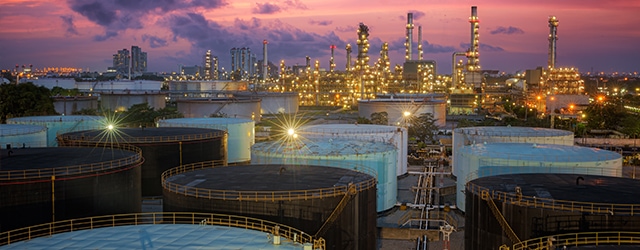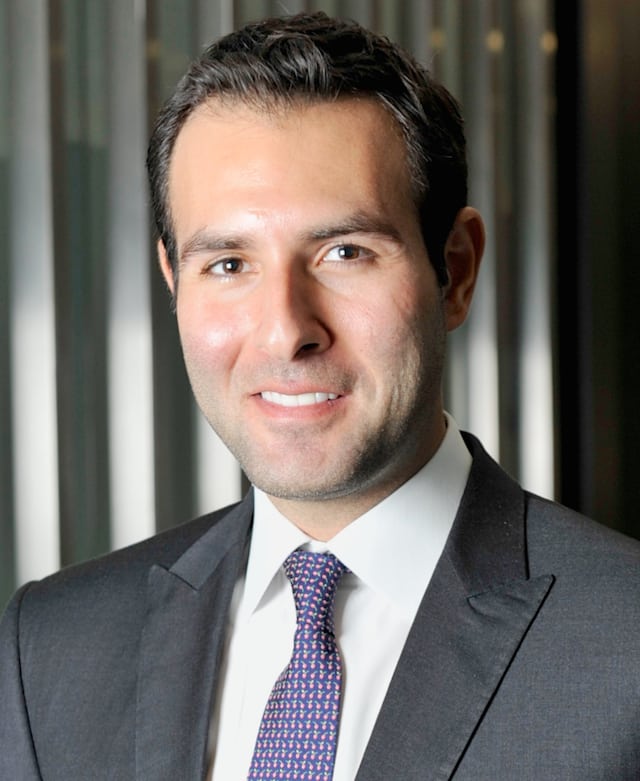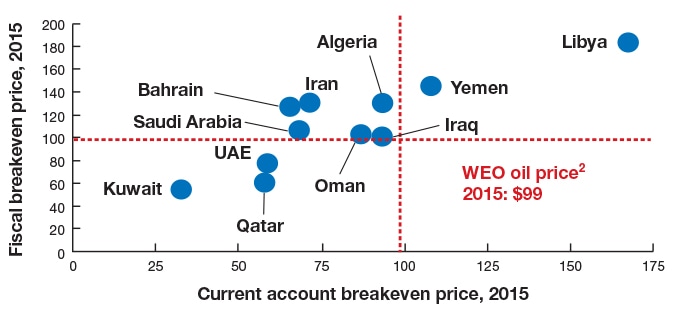Middle East | Emerging Markets Regional Review

The drop in oil prices is likely to affect public spending in the rentier states of the Persian Gulf, and pressure is mounting on governments to reduce economic dependency on hydrocarbons.
Billionaire Saudi investor prince Al-Waleed bin Talal al Saud wrote an open letter to the kingdom’s ministers in October expressing his “astonishment” at remarks made by oil minister Ali Al-Naimi that lower oil prices were “no cause for alarm.” Indeed the slide in prices has laid bare the economic policies of the six-nation Gulf Cooperation Council and may lead to cuts in public spending or a rollback of politically sensitive subsidies. In a knee-jerk reaction to the Arab Spring, GCC governments ramped up expenditure to drive growth and soothe dissatisfied citizens. As a result the fiscal break-even price for a barrel of oil has rocketed (see chart). Yet the Middle East grapples with some of the world’s highest rates of youth unemployment—which, the International Labor Organization predicts, will rise to 28.4% by 2017.
With the exception of the United Arab Emirates, the GCC countries have had limited success in diversifying their economies. In the case of Saudi Arabia, 90% of government income is derived from oil revenues, according to regional broker MubasherTrade. In its latest outlook the International Monetary Fund predicts Saudi Arabia will swing into deficit in 2015, one that could widen to 7.5% of GDP by 2018. The fund forecasts real GDP growth for the GCC will average 4.5% in 2015—some way from the average of 5.4% between 2000 and 2010. Elsewhere in the region so-called countries in transition, such as Egypt and Libya, will record growth of 3.8% in 2015, the IMF predicts.

Saudi Arabia—the region’s largest economy—has announced it will open its stock market, known as the Tadawul, to international investors. With a market capitalization of $530 billion, or equivalent to around 70% of GDP, international investors will be able to gain exposure to petrochemical, banking and construction companies. The exchange’s regulator, the Capital Markets Authority, is paving the way for international investors’ direct participation in Saudi capital markets for the first time by mid-2015. Bassel Khatoun, head of MENA equities, local asset management, at Franklin Templeton Investments in Dubai, considers it a major development. “Opening the Saudi Arabian equity market to foreign direct investment in 2015 will be a massive step forward for the region. As the largest equity market in MENA this would put the region back on international investors’ radar.”
With less oil revenue it remains to be seen whether the kingdom will to dip into the more than $700 billion it holds in reserves to sustain the same rate of public spending. Even so it has already declared it will spend $133 billion, roughly equivalent to $10,000 for every citizen, to boost welfare spending and create jobs.
United Arab Emirates was chosen to host Expo 2020 at the end of last year and has indicated it will tender infrastructure projects related to the expo in Dubai in the first quarter of 2015. Standard Chartered says the bill for hosting the event will be
$9 billion, and estimates 300,000 jobs will be created—with the housing and hospitality sectors being the principal beneficiaries. The Dubai government expects 25 million people to visit the purpose-built 438-hectare site, placing it far ahead of other major tourist destinations and recent Expo events, according to Capital Economics. However, concerns over Dubai’s debt pile continue to linger in the minds of investors, with vivid reminders dotting the skyline of the 2009 crash in the real estate and equity markets—both of which are again showing signs of overheating. Around $40 billion of debt is due for repayment between 2015 and 2018, Capital Economics calculates. Nevertheless, the UAE as a whole continues to be the recipient of significant capital inflows as a result of its reputation as a safe haven and strong local investment opportunities.
Egypt is showing signs of increased stability—after a number of years of geopolitical upheaval—with analysts becoming bullish about the outlook for the country’s economy. Simon Kitchen, director of strategy at EFG Hermes in Dubai, is in no doubt of the country’s potential. “Egypt is the most favorable destination for investment in the region, [and] a period of relative political stabilization over the past 18 months has created the chance for Egypt to make economic reforms and invest in infrastructure.” He cites the logistics and energy sectors in particular. “Egypt needs to build more railways, ports and roads, as well as warehousing and storage infrastructure.” Given its acute power shortages, Kitchen expects high levels of investment in power generation and distribution, including renewable energy.
Assuming Qatar retains its status as host of the 2022 FIFA World Cup—the related bribery scandal is still making headlines worldwide—its ambitious infrastructure investment program will continue undiminished. And although oil prices have dipped, the country will still run a large budget surplus. Jason Tuvey, Middle East economist at Capital Economics, says Qatar is well placed to cope with reduced oil revenues. “In spite of the recent slowdown in credit growth and sluggish growth in oil production, we expect Qatar to remain the region’s best-performing economy.”
A NEW ECONOMIC PARADIGM
The region has some of the highest rates of penetration for social media use in the world, and with significant levels of youth unemployment there are some who believe there is scope to build a dynamic digital economy. Tarek Sultan Al Essa, CEO and vice chairman of the Board of Agility, a Kuwait-listed logistics company, says structural reforms are key to overcoming the unemployment miasma. Making it easier to start and run a business, including online businesses, is fundamental, he believes. “Currently, this sector is still small, largely unregulated and unsupported,” Sultan says. “Hand-in-hand with other measures, like a clear and easy framework for starting new businesses and stronger technical education, e-commerce has real potential.”
Sultan says digitization of commerce provides the right platform to drive local employment and economic diversification, as well as attracting young talent away from their obsession of working in government: Oil-rich countries in the region continue to rely on investing in state-held jobs in order to manage unemployment and maintain citizens’ satisfaction. In Saudi Arabia, for example, the public-sector wage bill accounts for around 12% of GDP, notes the IMF.
For now the Middle East is a two-tier region. In the GCC, governments have capital buffers to shield them from lower oil prices. Elsewhere, countries will benefit from lower crude prices. But the question remains whether the entire region has the appetite for the reforms demanded by the Arab Spring. n




